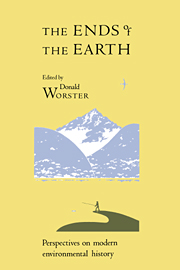12 - Toward a Biosphere Consciousness
Published online by Cambridge University Press: 05 June 2012
Summary
Some years ago I found myself guilty of categorizing people into two groups. The occasion was a meeting of anthropologists and ecologists held at Cambridge University, where I was asked to consider the ecological relationships of “primitive people,” meaning hunter-gatherers, huntergardeners, nomadic pastoralists, and others who had retained a self-sufficient existence, largely cut off from the influence of the dominant cultures of the earth. What categorized these people, from one viewpoint, was their ability to survive, year after year and often for centuries or longer, on the resources of a single ecosystem or contiguous and related ecosystems. Through one means or another, they had achieved a sustainable way of life that did not bring about changes in the natural biota deleterious to their continued existence. I called these “ecosystem people.”
By contrast, apparently since the rise of civilization, the societies and cultures that are featured in the history books have demonstrated a capacity to overexploit and convert productive ecosystems into near barren wastelands. Although this capacity has in the past contributed to the collapse of kingdoms and empires, the practice of overexploitation (or the consumption of natural resource capital) continues today. Now those who are tied in with the global economy can continue to survive despite destructive exploitation of local environments. Through the exchange of the products of industry they can draw on the total resources of the biosphere to override the controls previously exercised through the productive limits of local animal and plant populations.
- Type
- Chapter
- Information
- The Ends of the EarthPerspectives on Modern Environmental History, pp. 277 - 288Publisher: Cambridge University PressPrint publication year: 1989
- 7
- Cited by



